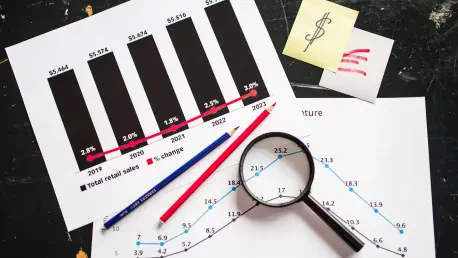Recent activity in Greece’s financial market paints a nuanced picture of economic potential juxtaposed against immediate challenges. The Athens Stock Exchange (ATHEX) has shown a mixed performance, with its index dropping slightly by 0.41% to close at 1,828.31 units. This movement, synchronous with broader European stock trends, suggests shared sentiments among investors. The traded value on ATHEX also fell from EUR 216 million to EUR 196.5 million, highlighting a reduction in trading activity. This pattern could signpost broader apprehension or influence from external economic conditions. Concurrently, crucial corporate maneuvers, including Piraeus Bank’s asset restructuring and Corinth Pipeworks’ engagement in pivotal infrastructure projects, underscore strategic shifts aiming for future growth. Attempting to streamline operations and focus on infrastructure development reflects both current challenges and opportunities within Greece’s financial landscape. Such dynamics could inform sustainable growth and investment strategies in the ensuing years.
Stock Market Performance and Trends
The Athens Stock Exchange’s recent slight decline was reflective of broader trends within the European markets, highlighting potential investor hesitance in the region. This downturn was accompanied by reduced trading value, indicating a possible shift in market sentiment. While some may view these fluctuations as a sign of instability, others might interpret them as part of the natural ebb and flow within a competitive financial environment. Moreover, several facets of Greece’s corporate sector have showcased significant activity that may influence long-term growth prospects. The strategic sale of Piraeus Bank’s majority stake in its non-core ATM business to Printec Group demonstrates a tactical approach to refining operational focus. This move allows the bank to concentrate more on its core strengths, potentially enhancing its overall efficiency while ensuring vital onsite cash services. Such maneuvers demonstrate a trend toward specialization and optimization, which could support sustained growth in various financial segments.
Corporate Transactions and Developments
Corporate activities within Greece have also evidenced notable strategies aimed at maintaining financial robustness and exploring new growth avenues. Piraeus Bank’s recent sale of a large portion of its non-essential ATM operations reveals a commitment to streamlining activities and prioritizing core banking functions. By retaining a considerable section of its ATM fleet within its branch network, the bank indicates the importance of accessible cash services for its clientele. Additionally, the announcement of Alpha Services and Holdings, and Bank of Cyprus trading ex-dividend soon, introduces another dimension to investment strategies. The concept of ex-dividend trading implies that purchasers of these stocks following specific dates might not be eligible for imminent dividend payments. Such strategies, while altering immediate appeal, can reflect longer-term fiscal planning and investor interest based on broader financial health. The focus continues on realigning operational priorities and promoting shareholder value, suggesting readiness for long-term investment prospects.
Infrastructure Projects as Growth Catalysts
Engagement in pivotal infrastructure projects further illustrates initiatives potentially enhancing Greece’s financial landscape. Corinth Pipeworks’ involvement in supplying essential materials for the Adriatica pipeline project in Italy exemplifies strategic participation in critical European infrastructure developments. This contract, entailing the supply of over 180 km of pipeline, emphasizes Corinth’s expertise in steel manufacturing for significant infrastructure ventures. Natural gas is widely seen as an interim energy source as Europe transitions toward more sustainable solutions, reinforcing the significance of such projects. Besides supporting immediate business growth through technology participation, involvement in infrastructure projects conveys broader economic benefits and diversification potential. Modalities that intertwine Greek companies with international energy plans also reflect strategic orientations for growth beyond domestic boundaries. Professional participation in global initiatives mirrors intentions to capture diverse opportunities aligned with long-term prospects for robust financial performance.
Financial Results and Seasonal Influences
Quarterly financial reports from key companies like Ideal Holdings, Alpha Trust Andromeda, and AS Company offer insights into operational dynamics influencing Greece’s market growth outlook. Ideal Holdings reported a 9% revenue drop year-on-year, attributed largely to slowed IT sector engagement post-public project completions. This underscores the impact of project cycles on financial outcomes and the necessity of adaptive strategies. Conversely, Alpha Trust Andromeda recorded only a mild 4% reduction in net profit, maintaining a favorable net asset value relative to its stock price. Such metrics suggest resilient fiscal health and strategic equilibrium amidst fluctuating variables. Notably, AS Company experienced a 54.2% revenue surge year-on-year, driven partially by Easter timing—alluding to seasonal influences on financial performance. Emphasizing a dividend proposal, AS Company seeks to return value to shareholders, potentially fostering investor confidence and reinforcing commitments to positive financial stewardship.
Anticipating Corporate Developments
Looking ahead, the alignment of significant yearly corporate events, including substantial meetings and financial decisions, serves as a roadmap for forecasting potential outcomes in Greece’s financial market. Detailed corporate calendars outline pivotal decisions around ex-capital returns and annual general meetings, offering investors foresight into corporate strategies and choices likely impacting stock prices. Considerations around shareholder equity and financial resolutions may shape investor sentiment and decision-making. Reflecting on recent maneuverings illustrates an overarching theme of companies realigning strategies to fortify their positions amidst shifting economic circumstances. This is evocative of broader market strengths resonating in an environment characterized by volatility and opportunity. Diverse pathways to enhance shareholder benefits through dividends reflect precise strategic planning and calculated moves toward recovery and growth. Such initiatives amplify potential for stability and optimism, shaping Greece’s economic contour positively, promising longevity in its financial prospects.
Strategic Growth and Future Prospects
Greece’s financial market is currently experiencing a complex interplay of opportunities and challenges. The Athens Stock Exchange (ATHEX) recently recorded a modest decline, with its index decreasing by 0.41%, closing at 1,828.31 units. This deviation mirrors broader European trends, suggesting shared investor sentiments. Additionally, the trading value on ATHEX witnessed a dip from EUR 216 million to EUR 196.5 million, reflecting reduced trading activity possibly influenced by broader economic pressures. Meanwhile, significant corporate activities offer a glimpse of strategic realignments. Piraeus Bank is undertaking asset restructuring, while Corinth Pipeworks actively participates in key infrastructure projects. These moves highlight attempts to optimize operations and concentrate on growth-centric developments, illustrating both challenges and opportunities in Greece’s financial landscape. Such maneuvers could pave the way for sustainable growth and investment strategies, shaping the country’s economic trajectory in the years ahead.









